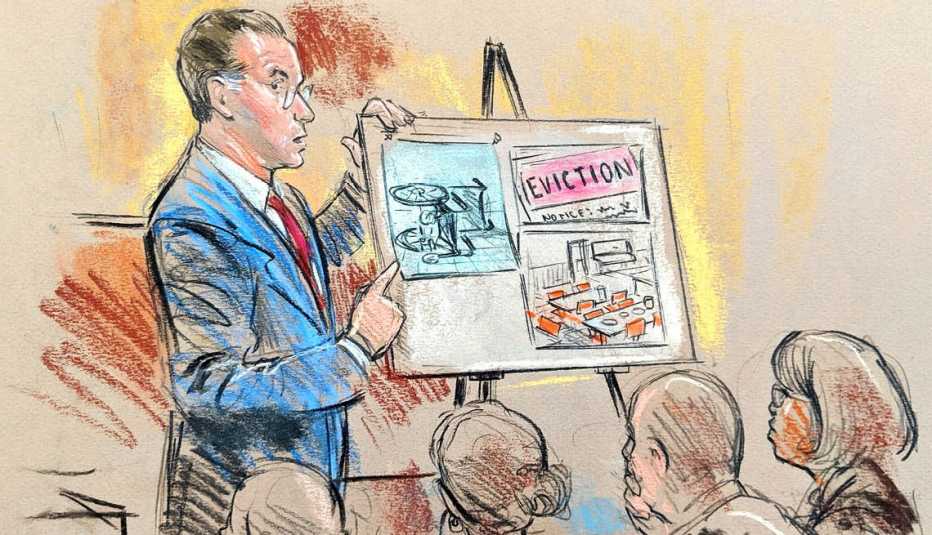AARP Hearing Center


Bickering or harassment?
The situation: In 2014, after her same-sex partner of 30 years died, Marsha Wetzel of Skokie, Illinois, moved into a senior-housing complex, where she asserted that residents began harassing her relentlessly for being openly gay. One woman at Glen Saint Andrew Living Community, Wetzel claimed, overturned Wetzel's cafeteria table with a wheelchair, telling her, “Homosexuals will burn in hell.” Wetzel, then in her late 60s, was spat upon, struck in the head and tormented by homophobic slurs, she said, and she reported these incidents to the facility's staff. Management took steps initially to stop the harassment, but the physical and verbal abuse continued, Wetzel noted. She blamed Glen Saint Andrew for not protecting her — and for trying to evict her instead. Management dismissed the conduct as ordinary “bickering” between “irascible,” “crotchety” older residents who had the right to argue as they pleased.
The case: Wetzel sued Glen Saint Andrew, alleging that it failed to provide her with nondiscriminatory housing and attempted to retaliate because of her complaints — both violations of the federal Fair Housing Act. The facility argued that even if Wetzel's claims were true, which Glen Saint Andrew disputed, liability would fall on the tenants, not on facility management.
And the Verdict is....
Yes
The case was filed in federal court in 2016 and dismissed in 2017 for failing to assert that the facility showed intent to discriminate. Wetzel appealed, and in a groundbreaking 2018 decision, the 7th U.S. Circuit Court of Appeals ruled that a landlord may be held liable under the Fair Housing Act for failing to protect a tenant from known, discriminatory harassment at the hands of other tenants. Wetzel claimed that rather than taking action against the harassers, Glen Saint Andrew's staff waged a campaign to minimize her complaints and isolate her, relegating her to a less desirable dining room seat, for instance, and barring her from common areas. “I'd just go in my room and barricade my door and pray,” Wetzel said at the time. “I just felt like a slug, like I was nothing, like I wasn't even human.” After the Court of Appeals ruling, the matter was resolved, and though the details are confidential, her lawyer reports that Wetzel, now 72, is happily living in a senior complex in Chicago.
The lesson: Speak up! “If you're experiencing harassment and discrimination at the hands of residents where you live — whether based on sex, religion, race, disability or other protected categories of the Fair Housing Act — it's the landlord's responsibility to put an end to it,” says Karen Loewy, lead counsel in the Wetzel case. “Remember, you're protected under the law.” And the same safeguards apply when renting or buying a home, getting a mortgage or seeking housing assistance. “We all deserve to live in a community that's safe, without fear of being bullied or harassed,” agrees Lisa Marsh Ryerson, AARP Foundation president. “We participated in this lawsuit because the fair-housing rights of older adults should never be subject to discrimination, on any basis.”
The Next Case:
A parent's nursing home bill: Should Medicaid or an adult kid pay?
The situation: John Pittas’ mother, Maryann, then in her early 60s, entered an Allentown, Pennsylvania, nursing home for rehabilitation after breaking both legs in a car crash. After six months of convalescence, she relocated to Greece, where her two other adult children live, leaving behind a mountain of unpaid rehab bills.
The case: The Health Care & Retirement Corp. of America, parent company of the Allentown rehab center, sued John Pittas for $92,943, under Pennsylvania's filial-support law, which requires a child to provide support for an indigent parent. Pittas argued that the nursing home should have considered alternate forms of payment, such as from Medicaid, his mother's husband or her two other children.
And the Verdict is....
Yes
Both a 2011 trial court and a 2012 appeals court found John Pittas responsible for his mother's unpaid nursing home bill, rejecting his arguments that the courts should have considered alternate forms of payment. Across the U.S., 29 states and Puerto Rico have laws making adult children financially responsible for their parents if the parents can't afford to take care of themselves. Pittas, a restaurant owner, then in his late 40s and with a wife who was pregnant with their second child, said he was “shocked” and “devastated."
The lesson: Pay your bills or get a good lawyer. “The case illustrates the problem with courts attempting to resolve issues with complex Medicaid implications,” says H. Amos Goodall Jr., president of the National Elder Law Foundation. “As a matter of state law in the majority of states, for a resident not receiving Medicaid benefits, a nursing home is free to go after the closest potential source of funds with the deepest pocket."


The Next Case:



































































More From AARP
What Caregivers Can Do When a Bank Rejects a Power of Attorney
Steps to take to ensure the key document is easily used